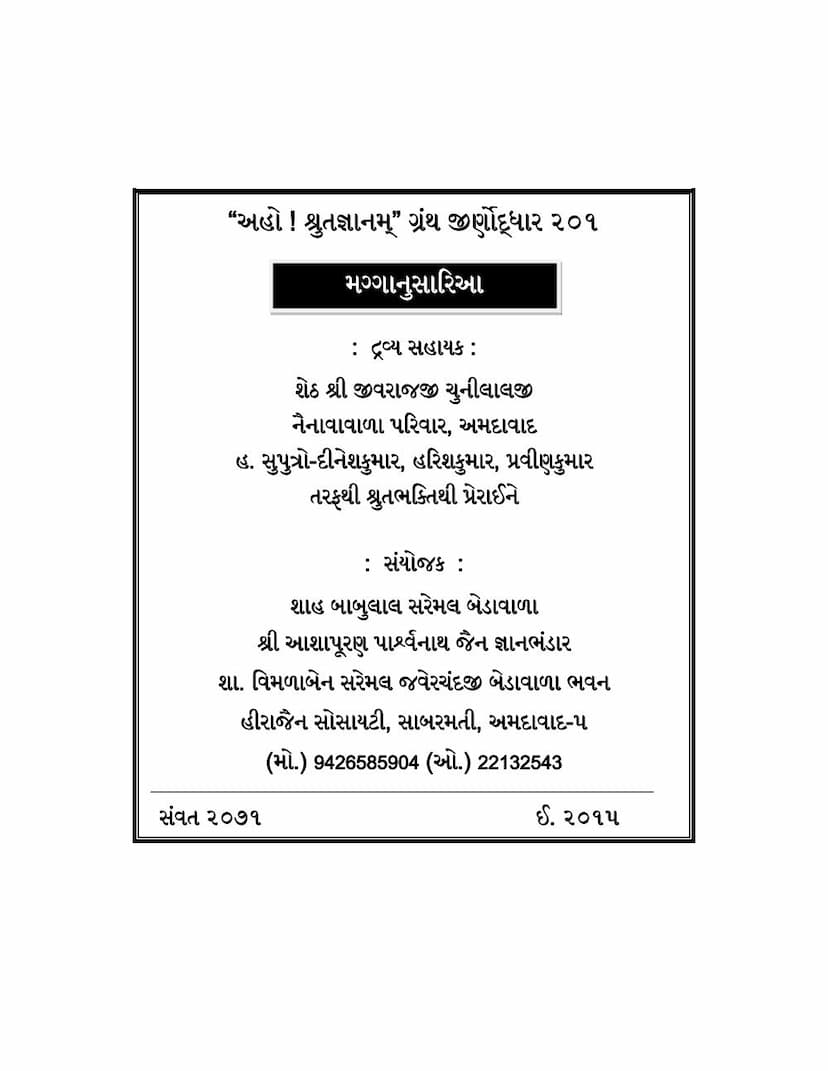Magganusariya
Added to library: September 2, 2025

Summary
Based on the provided text, here's a comprehensive summary of the Jain text "Magganusariya":
Book Title: Magganusariya (મગ્ગાનુસારિઆ) Author: D.S. Shah (ડી.એસ. શાહ) Publisher: Gnatputra Bhagwan Mahavir Trust (જ્ઞાતપુત્ર ભગવાન મહાવીર ટ્રસ્ટ)
Core Theme: "Magganusariya" translates to "Following the Path" or "Prerequisites of a Follower." The book focuses on the 35 essential qualities or virtues (ગુણ) that a true follower of Lord Mahavir's teachings should cultivate in their life. It aims to guide the seeker (મુમુક્ષુ જીવ) towards understanding and embodying the principles of Jainism, ultimately leading to spiritual progress and liberation (મોક્ષ).
Key Concepts and Content:
-
The 35 Prerequisites: The central theme of the book is the detailed exposition of these 35 virtues. These are presented as essential qualities for anyone aspiring to follow the spiritual path laid out by Lord Mahavir. The text emphasizes that possessing these virtues is crucial for understanding the essence of Lord Mahavir's teachings.
-
Origin of the Teachings: The book attributes these 35 virtues to the renowned Jain scholar Acharya Hemchandracharya (હેમચંદ્રાચાર્યજી), who compiled them in a work approximately 900 years ago. The text highlights the enduring relevance and importance of these virtues across generations.
-
Structure and Content Breakdown: The text is divided into sections, each detailing specific virtues, often with explanations, examples, and scriptural references. While a complete list of all 35 virtues isn't explicitly provided in the excerpt, the detailed descriptions cover a wide range of ethical, moral, and spiritual principles essential for a Jain layperson and aspirant. Some of the key virtues discussed include:
- Nyayasampanna Vibhav (ન્યાયસંપન્ન વિભવ): Earning wealth through righteous and ethical means. This emphasizes honesty, integrity, and avoiding unjust practices.
- Shishtachar Prashansak (શિષ્ટાચારનો પ્રશંસક): Appreciating and practicing good conduct and etiquette.
- Marital Harmony and Family Values: The importance of marrying someone of equal social standing and character, and the role of a virtuous wife in the household.
- Paapbhiru / Adhbhi (પાપભીરૂ / અડભી): Being fearful of sin and acting with righteousness, emphasizing introspection and avoiding unethical actions.
- Respect for Elders and Virtuous Conduct: The importance of serving parents, elders, and knowledgeable individuals.
- Practicing Ahimsa (Non-violence): This is a foundational principle, emphasized as the root of all Dharma, virtues, and a path to liberation. The text stresses the avoidance of harm to all living beings through thoughts, words, and deeds.
- Righteous Living: This includes adherence to vows (વ્રત), proper conduct (ચારિત્ર), mindful living (સામાયિક), and avoiding prohibited actions (અનાચાર).
- Importance of Samayik (સામાયિક): Equanimity and mindfulness are highlighted as crucial practices for spiritual progress.
- Control over Senses and Passions (Indriyas and Kashayas): The text emphasizes the necessity of conquering the senses and controlling anger, pride, deceit, and greed to achieve inner peace and spiritual growth.
- Modesty and Humility: The virtue of modesty (લજજા) is presented as a root from which heavenly virtues grow, essential for a virtuous life.
- Charitable Acts (Daan - દાન): The importance of various forms of charity, including food, medicine, knowledge, and fearlessness (abhaydan).
- Wisdom and Foresight (Dirghadarshi - દીર્ઘદર્શી): The ability to think long-term, plan wisely, and avoid immediate temptations for lasting benefits.
- Knowledge and Understanding (Visheshajna - વિશેષજ્ઞ): The value of seeking knowledge, understanding scriptures, and having clarity about the true nature of reality.
- Gratitude (Krutagnata - કૃતજ્ઞતા): The profound importance of acknowledging and reciprocating kindness, highlighting the dog as an example of unwavering loyalty.
- Popularity (Lokpriyata - લોકપ્રિયતા): Achieving popularity through selfless service, virtuous conduct, and a compassionate nature.
- Compassion (Daya - દયા): The fundamental principle of Jainism, extending kindness and non-violence to all living beings.
- Balanced Approach (Dharma, Artha, Kama): The importance of pursuing these worldly goals in harmony without contradicting each other or straying from Dharma.
- Financial Prudence: Spending according to income and dressing appropriately based on one's economic status.
- Theological Principles: Discussions on causality (Nimit – નિમિત્ત), the nature of soul (Jiva), the process of karma, and the path to liberation (Moksha).
-
Spiritual Foundation: The book reinforces the core Jain principles of Ahimsa (non-violence), Anekantavada (multiplicity of viewpoints), and Syadvada (conditional predication) as the basis for righteous living. It emphasizes that true spiritual progress is achieved through inner transformation and ethical conduct, not merely outward rituals.
-
Practical Guidance: "Magganusariya" is not just theoretical; it offers practical guidance for householders to integrate these virtues into their daily lives, making their human existence successful and meaningful.
-
Publisher's Initiative: The text mentions that the book is part of a larger project by the "Aho Shruta Jnanam Granth Jirnodhar" initiative, which aims to digitize and preserve rare and ancient Jain manuscripts and make them accessible through DVDs and online platforms like www.ahosrut.org.
Overall Purpose: The book serves as a practical manual and ethical guide for Jain followers, outlining the fundamental virtues necessary for spiritual discipline, ethical conduct, and ultimately, the attainment of ultimate happiness and liberation. It encourages followers to embody these qualities in their journey through life, striving to live in accordance with the teachings of Lord Mahavir.